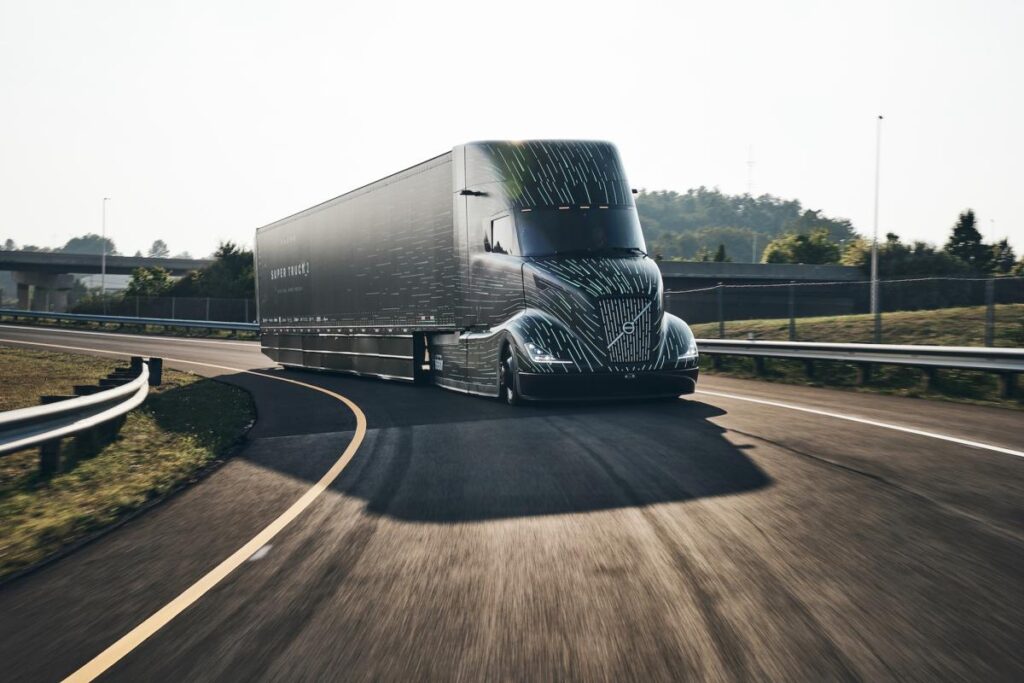Volvo Trucks North America has unveiled the company’s SuperTruck 2, with the debut on the company’s YouTube channel.
The SuperTruck 2 program, a public-private partnership with the U.S. Department of Energy (DOE) tasked OEMs with achieving a 100 percent freight efficiency improvement over their submitted 2009 baseline. Despite the daunting supply chain challenges facing the advanced engineering team throughout the COVID-19 pandemic, Volvo Trucks not only achieved the DOE objective but exceeded expectations, achieving 134 percent increase in freight efficiency.
Volvo Trucks’ SuperTruck 2 will make its first public appearance in the Volvo Trucks booth (#4097) at the American Trucking Associations’ 2023 Management Conference & Exhibition, taking place Oct. 14-17 in Austin, Texas, offering a glimpse at styling and engineering cues for future generations of trucks.
“Partnering with the DOE for the SuperTruck program provides an exciting opportunity to push the technology envelope to see what’s technically possible for heavy-duty transportation and which solutions can be scaled into production, but equally important, which solutions don’t work for scaled production,” said Peter Voorhoeve, president, Volvo Trucks North America.
“We are extremely proud of the accomplishments of our advanced engineering team who worked on SuperTruck 2. A program of this magnitude pushes the limits in every possible area — creativity, problem solving, feasibility and innovation, to which we feel we did successfully. Some of the technologies on SuperTruck 2 will most certainly shape the future of trucking and change everything we once thought possible.”
DOE’s SuperTruck 2 program promotes research and development to improve the freight- efficiency of heavy-duty Class 8 long-haul tractor-trailer trucks. The program aims to accelerate the development of cost-effective advanced efficiency technologies not currently available in the market.
For SuperTruck 2, all participating OEMs were given the goal of demonstrating more than 100 percent improvement in vehicle freight efficiency [ton-mile-per-gallon]. Volvo Trucks met that goal and exceeded its internal stretch goal of 120 percent freight efficiency improvement relative to the 2009 baseline, achieving 134 percent under real world demonstrator validation.
For Volvo Trucks’ SuperTruck 2 program, advanced aerodynamics are the key to optimizing fuel efficiency. Starting with a cab perfectly wedge shaped from front to back including a raked and wraparound windshield, a front end designed around a downsized cooling package, a fully aerodynamic trailer with gap fairings, skirts and boat tail, as well as an adjustable ride height. Volvo Trucks also replaced the traditional hood and cab mounted mirrors with a streamlined camera monitoring system to reduce the drag by more than 4 percent.
The entire tractor trailer combination was designed to smoothly displace air with minimal resistance, resulting in 50 percent lower drag than Volvo Trucks’ 2009 baseline. This represents a roughly 20 percent improvement in aerodynamic drag over Volvo Trucks’ SuperTruck 1.
Approximately two-thirds of the drag reduction in SuperTruck 1 over the 2009 baseline came from trailer aerodynamic treatments — optimizing the skirt and boat tail. Since SuperTruck 2 also boasts optimized trailer skirt and boat tail, most of its aerodynamic gains over SuperTruck 1 can be attributed to a brand-new cab design, including a radically different windshield, while SuperTruck 1 was a slightly modified version of a VNL 670 cab. SuperTruck 2 demonstrated the potential for significant aerodynamic gains from changing the Body-in-White.
In addition to the aerodynamics advancements, engineers implemented several weight reduction strategies to achieve a significantly reduced curb weight of 27,000 lbs. for the combined truck and the trailer. Volvo Trucks chose to utilize a 4×2 configuration, which is not common in the United States but is frequently utilized in Europe using fewer axles for the same payload. The truck was designed so it could be applied to a 6×2 or 6×4 configuration, but that was not part of the specific demonstrator validation for this program.
The shorter cab design is lightweight and paired with an aluminum chassis that uses a lightweight optimized drive axle system with a single composite driveshaft.
Volvo Trucks worked with the project partner trailer manufacturer to incorporate a custom, lightweight aerodynamic trailer with an optimized aerodynamic shape of the full truck and trailer to appear as one seamless unit. Volvo Trucks also worked with the project partner tire manufacturer to include lightweight, smaller 19.5-in. advanced low-friction tires on both the SuperTruck 2 and its custom trailer.
With a focus on the driving environment, the Volvo Trucks SuperTruck 2 features a 48-volt micro hybrid system that acts as a generator with an integrated starter. This provides power for driver comfort features, including an all-electric HVAC system that allows the driver to avoid idling during rest breaks and still have power for amenities.
“The project team deliberately focused on driving in real world conditions for testing. Data wasn’t just gathered in a lab or on flat, empty roads with optimal conditions and a light load. Instead, our SuperTruck 2 was tested in real-world scenarios on roads with traffic and elevation changes with a GCVW of 65,000 lbs.,” continued Voorhoeve. “This is the most aerodynamic and efficient truck Volvo has built to date, and we achieved a freight efficiency that demonstrates the potential for technology innovations to be developed commercially. Our engineers have already begun implementing some of the learnings from SuperTruck 2 into our future truck models. The future of trucks is just around the corner.”
Volvo Trucks worked in cooperation with the following SuperTruck 2 project partners:
- Bergstrom
- Johnson Matthey
- Metalsa
- Michelin
- Motivo Engineering
- Oak Ridge National Laboratory
- Knight Transportation
- Wabash National
- Wegmans
- University of Michigan
For more information, visit volvotrucks.us
The SuperTruck 2 program, a public-private partnership with the U.S. Department of Energy, tasked OEMs with achieving a 100 percent freight efficiency improvement over their submitted baseline. VTNA not only achieved the DOE objective but exceeded expectations, achieving 134 percent increase in freight efficiency.
This story also appears on Truck and Trailer Guide.
Read the full article here


